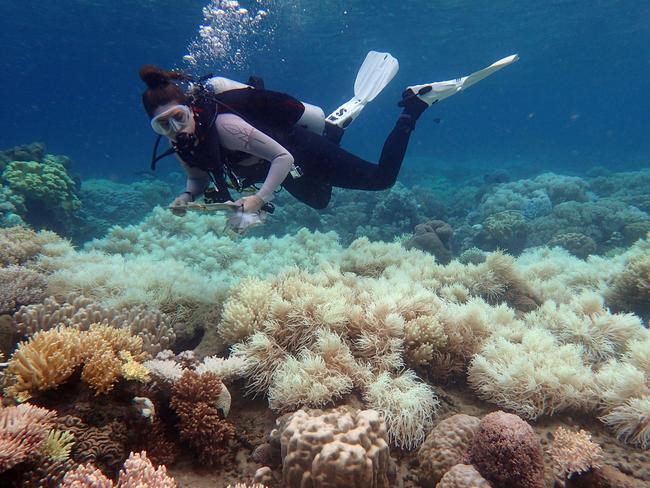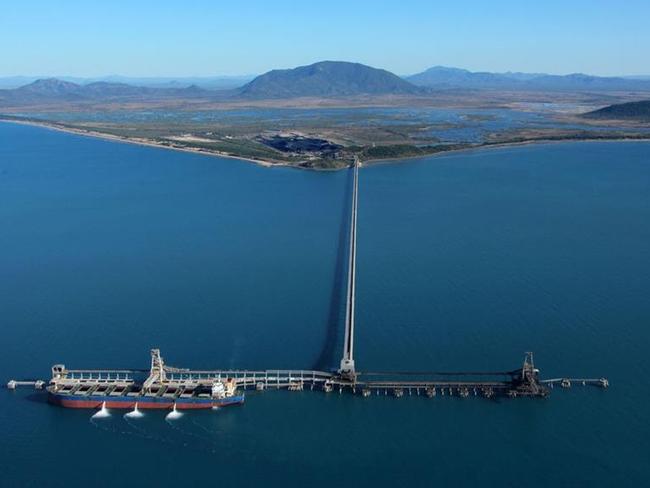Half the Great Barrier Reef may have died in last two years
THE head of the Great Barrier Reef Marine Park Authority has confirmed back-to-back bleachings may have killed off as much as half the reef.
AS MUCH as half the Great Barrier Reef may have died in the back-to-back bleachings over the past two years.
But the head of the authority in charge of the reef says the actual extent of damage is tricky to calculate because some parts are growing well.
The Great Barrier Reef Marine Park Authority believes about 30 per cent of coral, in the reef’s northern part, died last year in bleaching caused by warmer ocean waters, chairman Russell Reichelt told a Senate committee on Monday.
Surveys after this year’s bleaching are still being done but initial observations suggest 20 per cent of coral — mainly in the central area of the 344,000 sq km reef — is dead.
“Don’t think of these figures as the net amount of coral on the Barrier Reef because there are quite big movements upwards as well as downward,” Dr Reichelt told the senators at an estimates hearing in Canberra.
The southern part of the reef had grown by about 40 per cent in recent years because it hadn’t been hit by cyclones or bleaching — but it was likely it would suffer from those in the future.
Dr Reichelt said the bigger picture question was the coral’s resilience in the face of bleachings, tropical storms and other threats such as the crown of thorns invasions.
“It depends on the frequency of these major impacts and the concern is the frequency could well be increasing and the recovery time will be insufficient,” he said.
“If the recovery time is very short, there won’t be a lot of coral.”
The best science suggests global warming needs to be limited to 1.5 degrees to allow a good survival rate for coral.
There had already been a 0.7 degree warming over the past century, Dr Reichelt said.
“I draw the public’s attention and the committee to the fact the unprecedented back-to-back bleaching we’ve seen is occurring on a fraction of a degree (rise in temperature),” he said.
“The safe levels (of warming) for coral reefs, probably we’ve passed already.”

Dr Reichelt said the authority accepted the need to change its approach.
He said he agreed “more or less” with comments from Professor Ian Chubb, a former national chief scientist and Australian National University vice-chancellor, who told Fairfax the Reef 2050 Plan needed to be redrawn as it did not address the greatest threat facing the reef — climate change.
Prof Chubb is chairman of the independent Expert Panel advising the government on the implementation of the plan to protect the reef. The panel wants the plan revised to include steps to cut emissions and help the reef adapt to global warming that’s already being felt.
Greens senator Larissa Waters told news.com.au there was a clear call for climate change to be better addressed by government in order to save the reef.
“Dr Reichelt made a comment that we had already passed safe levels for the reef,” she said.
“It’s widely understood that with two degrees of warming, we will lose all reefs globally.”
She said limited global warming to 1.5 degrees was essential if the reef was to have any long term future.
Yet, she said the Turnbull Government was bending over backwards to facilitate the development of one of the largest coal mines in the world, potentially providing mining company Adani with a taxpayer-backed concessional loan and environmental approvals.
Adani’s $21 billion Carmicheal coal mine has been hugely controversial among environmental groups which are concerned about the emissions the coal will produce once it is dug up.
Conservative radio announcer Alan Jones has also expressed disbelief about the granting of a water licence to Adani, which will give its mine unlimited access to groundwater for the next 60 years with no government oversight.
RELATED: Is this the worst mistake Australia could make?
It’s also clear that most Australians do not support giving coal mine projects money.
A new ReachTEL poll, commissioned by the Australian Conservation Foundation, found just 6.8 per cent of people supported the idea of using public money to support coal mine projects.
The Federal Government is considering providing Adani with a $900 million concessional loan from its Northern Australia Infrastructure Fund to help it build a rail line linking the central Queensland mine with Abbot Point port so it can ship the coal overseas.
But in a separate Senate hearing, it was revealed an independent body charged with assessing major projects, Infrastructure Australia, has not done a cost-benefit analysis on the project.

“The fact that the premier infrastructure body that looks at national ideas and ranks them in a priority list has not considered it, clearly indicates that the Adani rail line is not a worthwhile investment,” Senator Waters said.
Federal Labor is also opposed to the loan, saying taxpayers shouldn’t be used as an “ATM for Indian coalmining companies”.
Today, Queensland Deputy Premier Jackie Trad also hosed down suggestions Adani was offered a “royalties holiday” to get its mine off the ground.
Under the mooted deal, Adani could have paid as little as $2 million a year in royalties for the first seven years, before slowly increasing to the full amount.
The estimated shortfall in royalties in the short term was around $350 million.
Talk of such a deal is believed to have caused major divisions in the state Labor cabinet, with the Left faction raising serious concerns. Ms Trad, a member of the Left, told reporters on Monday any such deal would break an election promise.
“We’ve got a pre-election commitment in relation to any subsidisation of Adani, and we made that commitment very clearly at the last state election, that there would be no royalty holiday or subsidisation of taxpayer funds for Adani,” she said.
“Having said that, I am part of a government that has made sure all of Adani’s statutory licensing arrangements have been pursued, so that the mine can get on and open, and employ people.”



